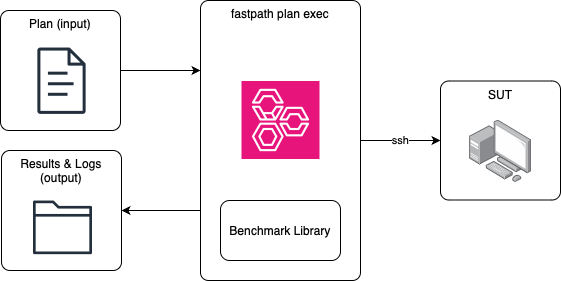Define & Execute a Plan
Introduction
A plan is a yaml file that defines:
The connection to the SUT that will run all the benchmarks
A list of software profiles for which the benchmarks will be run
A list of benchmark to run
The user creates a plan and passes it to Fastpath for execution. Fastpath configures the SUT for each software profile in turn, by installing the specified kernel and booting it with the specified command line parameters, etc, and runs the specified benchmarks, collating the results and logs into an output “resultstore”.

The plan may refer to supplementary benchmark yaml files which are part of a Benchmark Library. Fastpath ships with a default Benchmark Library. Users may additionally set up their own, private Benchamrk Libraries.
See Plan Schema for a full description of the plan and benchmark library.
Build a Simple Plan
Define the
sutsection:
sut:
name: my-fastpath-sut
connection:
method: SSH
params:
user: fpuser
host: <sut hostname>
port: <ssh port>
keyfile: <private key>
This section defines the parameters to connect to the SUT over SSH. Here we
assume you’re using the fpuser account as per the guide at
Setup & Configure a SUT. The port will usually be 22, and in that case there is no
need to specify it since that’s the default. The keyfile is the private key
associated with the user account which will allow logging in to the SUT via SSH
as described at Setup & Configure a SUT.
Alternatively, you could define all of this as part of your ~/.ssh/config then refer to the config name using the only host field:
sut:
name: my-fastpath-sut
connection:
method: SSH
params:
host: my-fastpath-sut
Warning
The private key must be kept secure as it can be used to access the SUT with root privileges.
Define the
swprofilesunder which the benchmarks will execute:
swprofiles:
- name: without-mthp
kernel: /path/to/Image.gz
modules: /path/to/modules.tar.xz
cmdline:
- thp_anon=64K:never;2M:madvise
- name: with-mthp
kernel: /path/to/Image.gz
modules: /path/to/modules.tar.xz
cmdline:
- thp_anon=64K:always;2M:madvise
Each swprofile must contain the path to the kernel image, and if modules are needed then the path to the modules tarball must be provided as well. See Build a Suitable Kernel for a guide to building an appropriate kernel.
This example defines 2 swprofiles, both using the same kernel but one has 64K multi-size THP disabled and the other has it enabled. This demonstrates how to configure the kernel command line. We give each swprofile a convenient name so that we can easily refer to them when doing analysis on the results.
Define the
benchmarksto execute:
benchmarks:
- include: speedometer/v2.1.yaml
- include: mmtests/kernbench.yaml
Here we will run 2 benchmarks, Speedometer v2.1 (Javascript benchmark) and kernbench (Time to compile the linux kernel). The actual benchmark definitions are in the yaml files within the Benchmark Library.
Add some miscellaneous parameters:
defaults:
benchmark:
warmups: 1
repeats: 3
sessions: 2
timeout: 1h
Each benchmark may specify some optional parameters, including how many times to run each benchmark and a per-iteration timeout. In cases where the values are not explicitly provided for a benchmark, Fastpath will fallback to default values, which can be specified globally here. In this case, we request 2 sessions meaning the system will be booted twice. Then in each session we will run 1 warmup run, where the results are discarded, and 3 normal repeats where the results are kept. See Plan Schema for more info.
Putting it all together, we have the following which should be saved as demo.yaml:
sut:
name: my-fastpath-sut
connection:
method: SSH
params:
host: my-fastpath-sut
swprofiles:
- name: without-mthp
kernel: /path/to/Image.gz
modules: /path/to/modules.tar.xz
cmdline:
- thp_anon=64K:never;2M:madvise
- name: with-mthp
modules: /path/to/modules.tar.xz
cmdline:
- thp_anon=64K:always;2M:madvise
benchmarks:
- include: speedometer/v2.1.yaml
- include: mmtests/kernbench.yaml
defaults:
benchmark:
warmups: 1
repeats: 3
sessions: 2
timeout: 1h
Let’s validate the plan with the following command:
fastpath plan show demo.yaml
This will parse, normalise, flatten, and validate the plan. If your plan is buggy, this command will tell you why. If your plan is well-formed, it will output the plan in its final form:
%YAML 1.2
---
defaults:
benchmark:
repeats: 3
sessions: 2
warmups: 1
timeout: 1h
sut:
name: my-fastpath-sut
connection:
method: SSH
params:
host: my-fastpath-sut
user: null
port: null
keyfile: null
swprofiles:
- name: without-mthp
pkgtype: null
kernel: /data_nvme0n1/ryarob01/fastpath/demo/assets/Image.gz
modules: /data_nvme0n1/ryarob01/fastpath/demo/assets/modules.tar.xz
cmdline:
- thp_anon=64K:never;2M:madvise
sysctl: []
bootscript: []
gitsha: null
- name: with-mthp
pkgtype: null
kernel: /data_nvme0n1/ryarob01/fastpath/demo/assets/Image.gz
modules: /data_nvme0n1/ryarob01/fastpath/demo/assets/modules.tar.xz
cmdline:
- thp_anon=64K:always;2M:madvise
sysctl: []
bootscript: []
gitsha: null
benchmarks:
- suite: speedometer
name: v2.1
type: browser
params: {}
image: registry.gitlab.geo.arm.com/software/linux-arm/fastpath/containers/speedometer:v1.0
repeats: 3
sessions: 2
warmups: 1
timeout: 10m
- suite: mmtests
name: kernbench
type: system
params:
config: |-
export KERNBENCH_ITERATIONS=1
export KERNBENCH_VERSION=6.12
config-base: configs/config-workload-kernbench-max
performance-governor: 'False'
image: registry.gitlab.geo.arm.com/software/linux-arm/fastpath/containers/mmtests:v1.0
repeats: 3
sessions: 2
warmups: 1
timeout: 1h
Execute the Plan
Execute the plan, placing the results in the results directory:
fastpath plan exec --output results/ demo.yaml
The plan will execute, showing a progress as benchmarks are completed:
Executing demo.yaml...
3%|██▍ | 1/32 [05:01<2:35:48, 301.57s/it]
Upon completion, the results can be managed and analysed using various Fastpath commands. See Store & Analyse Results for more information.